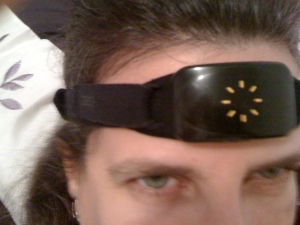Me & My Zeo: (Or, How my bedroom became a sleep lab)

My friend DNMNK recently lent me his Zeo for a few weeks. The Zeo is a nifty device that looks like a digital alarm clock with a removable headband. You wear the headband to sleep and the Zeo records your sleep stages and data. You then upload your sleep data to Zeo.com where you can see your sleep patterns graphed on your own personal Zeo sleep page.
You learn, among other things, how long it takes you to fall asleep, how often you awaken during the night (more times than you’re aware of) and for how long you are in REM, Deep Sleep, Light Sleep and Wake during the night.
I asked DNMNK if I could borrow his Zeo for a couple of reasons. First, the purpose of the Zeo is to help educate people about their sleep patterns so they can create conditions for improving their over all sleep. Ater all, a good night’s sleep helps us with memory consolidation, emotional regulation, general feelings of health and well-being, and more. Since I am someone who wakes once or twice each night and sometimes has trouble returning to sleep, and because I’m often sleepy during the day, I wanted to see what I could learn about my sleep patterns and how to improve them by using the Zeo.
Also, I am a prolific dreamer. I remember my dreams every night—several, in fact. This is much more than the average person, who is lucky to recall 3 dreams in a week. I wanted to see how much time I actually spend in REM sleep, and assumed, that my percentage of REM would be very high. The average person spends 25 percent of their sleep time in REM, the sleep stage known for generating the most dreams and the most vivid ones. Based on the length and detail of my nightly dream reports, I figured I must be in REM for nearly the entire night.
What I discovered was quite different from what I expected.
After collecting about 10 nights worth of Zeo data I learned that in fact I spend an unusually small amount of time in REM sleep. Turns out, I spend about 14 minutes in REM each night as opposed to the average for a woman my age of an hour and 44 minutes. What was I to make of the fact that I’m way below the average in terms of REM sleep, but way above average in dream recall?
Consulting with DNMK, who is also a neuroscientist who studies the dreaming brain, and also reading up on sleep stages on the Zeo web site, I learned a few interesting facts. For starters, the brain awake and the brain in REM sleep look very similar.
Zeo clocked me as being awake for nearly two hours per night. The average woman my age is awake for about 33 minutes a night. Here I was pretty much off the charts. Since it’s difficult to distinguish between the wake and REM-dreaming brain states, maybe I was dreaming in the state Zeo was recording as awake.
By tracking my dreams upon waking during the night and in the morning I began to see that this was in fact the case: I was dreaming when Zeo recorded me as being awake.
According to Zeo’s web site, the device is accurate 75 percent of the time. As a point of comparison, when DNMNK uses the Zeo, his experience of dreaming seems to match Zeo’s recordings of his sleep stages quite regularly.
So, what else might be going on in my case? One possibility raised by DNMNK is that I might be spending time in a state called hyper-aroused REM. In this sleep stage people often experience false awakenings (“waking” into a realistic environment, only to realize later one was actually still dreaming), which may lead to, or come after lucid dreaming (the hybrid state of consciousness in which one is sleeping and is aware that one is dreaming while doing so). Since I experience a fairly high number of false awakenings and lucid dreams, it is possible that I am experiencing this hyper-aroused REM state, a possibility that Zeo doesn’t account for in its data-collection system.

All of this has been an interesting revelation for me. Sleep is such an important part of our overall health and our experience of the world, so I am a strong proponent of each of us being our own sleep and dream scientist. This is one reason I keep a dream journal and encourage others to do the same. And it’s one reason I recommend trying out the Zeo. In future posts I’ll discuss other things I learned from my weeks spent with the Zeo. But for now, it’s time for me to get to bed!
This was quite interesting! I wonder what would come out of me, as I never (OK almost never ;-)!) remember dreams even though I’m aware I do dream a lot. Let’s say I remember 1-2 dreams A YEAR…. Now, It would be very hard for me keeping a dream journal. But I’m So happy for you remembering all yours, so keep on dreaming!
Have a great New Year start. G.